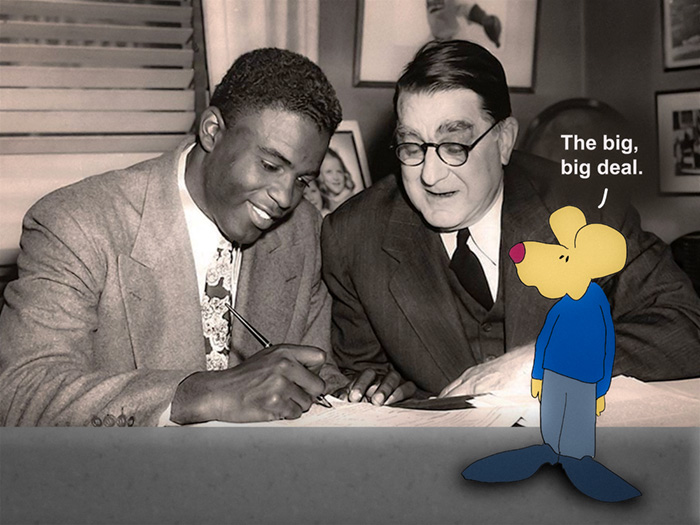The day I speak of happened in 1965. I was only one and a half years old at the time, so I didn’t even know who Branch Rickey was then. But that is who died that day, December 9, 1965.
Rickey was 83 years old at the time and had been in the hospital having heart issues. But, on December 9, he checked himself out of that hospital and then drove himself a hundred miles to give a speech that had previously been on his schedule.
Rickey walked up to the podium and said he had a big story to tell everyone about “spiritual courage.” He looked out and paused momentarily. Then, he said he could not continue. Branch Rickey collapsed right there on the stage, and a couple of days later, he died without uttering another word.
A lot of people liked Branch Rickey. He was always full of positive advice. He once told a group of kids that he had “three abides.” They were honesty, industriousness, and kindness. He went on to talk about that “infinite kindness,” saying it was “a kindness that transcends the form of courtesy… Out of infinite kindness grow real love and understanding and tolerance and warmth. Nothing can take the place of such an enduring asset.”
I should mention that baseball-great Jackie Robinson, the first black man to play professional baseball, attended his funeral. Rickey was the key figure in breaking Major League Baseball’s color barrier. He signed Jackie Robinson to the Brooklyn Dodgers in 1947.
Not only was Rickey instrumental in breaking the color barrier in MLB, but he also created the framework for the modern minor-league farm system. He was full of other innovations for baseball too. Perhaps the most important one was introducing the batting helmet. He also was responsible for tools we see all the time in baseball now but never existed before. Things like the batting cage and pitching machines.
Another good guy from Ohio, specifically Stockdale, Ohio. He was born on December 20, 1881, an adventurous Sagittarius.
But yes. He died on this date in 1965.
I should also mention another notable historical date for today, this one coming from 1946. On this date, the Christmas film classic “It’s a Wonderful Life” starring James Stewart, Donna Reed, and Lionel Barrymore premiered in New York. But my favorite was Henry Travers, who played Clarence Odbody.
Frank Capra directed it, and although it has become a timeless American classic, It’s a Wonderful Life totally flopped at the box office. In fact, it put Capra $525,000 in the hole. After that, he had to scramble for money, especially in making his next move, State of the Union.
But Rickey, baseball’s Rickey, is a reminder to all of us. His life is a bit of a personification when it comes to the message of the film. Rickey, by doing all the things he did, touched many lives. Think about all the black players who came through the major leagues in baseball after Robinson led the way with Rickey’s help. Think about all the lives that have been saved by the batting helmet. Or how much the game improved because he developed the farm club system, batting cages, and pitching machines.
One life touching many.
Believe it or not, that is all of us.
Every action we take, and every deed we do, good or bad, spans outward. I hate saying “ripples on the pond,” as it has become so cliche. But you might not get the same picture if I say something like an “object’s resonant frequency” instead of ripple.
At any rate, when we do something, it then touches one, who in turn touches two, three, and four, and they go on to touch many and beyond. And before you know it, our one single action has turned into a multitude.
Our multitudes spanning out into our world, out into the Universe. Just like George Bailey. Just like Branch Rickey. And so we go.
=====
“Everything turns, rotates, spins, circles, loops, pulsates, resonates, and repeats.”
― Suzy Kassem
=====
“We never know which lives we influence, or when, or why.”
― Stephen King
=====
“Example is not the main thing in influencing others. It is the only thing.”
― Albert Schweitzer
======
‘
Good thinking. Good doing. Wonderful life.
